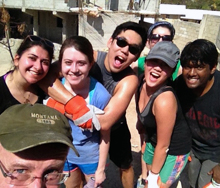CMU Students Will Lend a Hand in Haiti

Fourteen Carnegie Mellon students looking to make a difference, face a challenge, and move beyond their comfort zones will be heading to the Caribbean nation of Haiti this March over Spring Break. The trip, which is the second of its kind, is sponsored by the student organization CMU in Haiti and will be led by faculty advisor Michael West, Teaching Professor of French and Francophone Studies in the Department of Modern Languages.
The students are traveling to Haiti to lend a hand in a country that has long been plagued by poverty, corruption, and a gross lack of infrastructure. Currently, many Haitians make do without electricity, gas, and water on demand. Deforestation is a major threat to the environment. Both paved roads and schools are in short supply. Moreover, women in particular face threats to safety and must overcome barriers standing between them and more active participation in the economy.
Making a bad situation worse, a 7.0 magnitude earthquake struck Haiti in January 2010. The natural disaster left hundreds of thousands of people dead and more than one million people displaced, according to the United States Agency for International Development. Shortly thereafter, a cholera outbreak claimed the lives of even more inhabitants. Controversy ensued when it was learned that the outbreak could be traced back to one of the United Nations peacekeeping detachments sent to Haiti after the earthquake to stabilize the nation.
For decades, Haiti has been anything but stable, which is precisely why Professor West and students from Carnegie Mellon have turned their attention to the country. They want to help. “Even a small positive change can have much larger positive results,” says West.
While visiting Haiti, the group will be staying with a local community organizer named Réa Dol, Executive Director of the Society of Providence United for the Economic Development of Petion-Ville (SOPUDEP). SOPUDEP is a grassroots organization committed to creating social and economic change by supporting causes including education, economic development, and women’s and children’s rights.
In addition to providing shelter, Ms. Dol works with Professor West and the CMU students to help them identify people and organizations that will put the funds they’ve been raising to good use. Upon arrival, the crew from CMU will help distribute food and cooking supplies such as beans, rice, and oil at displacement camps; they will make cash donations to people in various camps as well as to local organizations, such as women’s microcredit groups; and they will listen to stories and ask questions in an effort to let locals know that someone is paying attention to their plight.
As for the monetary contributions, the Haitians are reportedly thankful for the funds, but in general do not want charity. Professor West described locals as talented, generous, proud of their country, and interested (in lieu of charity) in developing and increasing local expertise so that they can improve the conditions in their country using their own skills and knowledge. As the proverb goes, “Give a man a fish and you feed him for a day; teach a man to fish and you feed him for a lifetime.”
Many educated Haitians leave the country to get an advanced education overseas in fields such as medicine and engineering. Some of these people return to Haiti, but not enough to meet the country's need for a professionally trained class. Organizations in Haiti are trying to rectify this problem by creating scholarships that cover students' education and expenses outside of the country, provided that they agree to return to Haiti upon graduation, primed to use their newly gained knowledge to support efforts being made back home.
When it comes to making contributions, every little bit helps. Knowing this, West hopes to turn the Haiti trip into an annual one. “This is important work,” he says, “because it addresses real needs of real people.”
Students, too, are taking notice of Haiti’s needs and of their ability to help. The number of students traveling to the Caribbean country jumped from eight to fourteen between last year and this one, and Professor West would like to grow that number even more. He would also like to host Réa Dol in Pittsburgh, where she can deliver a firsthand account of the struggles her country are facing while also sharing her vision for the country’s future.
In the meantime, West will continue taking CMU students to Haiti so that they can see with their own eyes the challenges many Haitians are facing. “Most Carnegie Mellon students understand poverty and the problems of developing countries in the abstract,” he says, “but now a few students are beginning to understand it by meeting it face-to-face.”